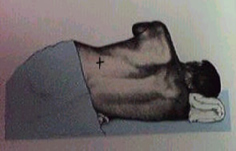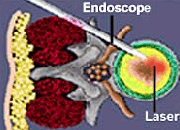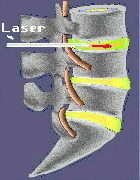
PERCUTANEOUS LASER DISC DECOMPRESSION (PLDD)
What is Disc Herniation?
Each disc of the spine is designed much like a jelly donut. As the disc degenerates from age or injury, the softer central portion can rupture (herniate) through the surrounding outer ring (annulus fibrosus). This abnormal rupture of the central portion of the disc is referred to as a disc herniation.
The most common location for a herniated disc to occur is in the disc at the level between the fourth and fifth lumber vertebrae in the low back. This area is constantly absorbing the impact of bearing the weight of the upper body. This is especially important when we are standing or sitting. The lower back is also critically involved in our body's movements throughout the day, as we twist the torso in rotating side to side and as we hinge the back in flexion and extension while bending or lifting.
Symptoms:
- Back pain that spreads to the buttocks and legs, when the herniated disk is in your lower back
- Neck pain that spreads to the shoulders and upper arms, when the herniated disk is in your upper back
- Tingling or numbness
- Muscle spasms or weakness
Surgery Technique:

PLDD treatment is usually done in outpatient basis which makes use of a local anesthesia. It involves using a thin needle that is inserted in the herniated disc assisted with X-ray equipment. Optical fiber is then inserted to the needle and through this fiber is where the laser energy runs through which vaporize a small part of the disc nucleus. This makes a partial vacuum thus drawing the herniation away from the nerve root thus relieving pain. You can immediately feel the effect.

Patients can get off right after the procedure is done and most patients can go back to work after four to five days. Since a thin needle is use you are free from any scar or cutting and since only a small portion of the disc is vaporized it does not result to spinal instability. PLDD is definitely much better than the traditional open back surgery since PLDD does not have the complications that open back surgery has.

